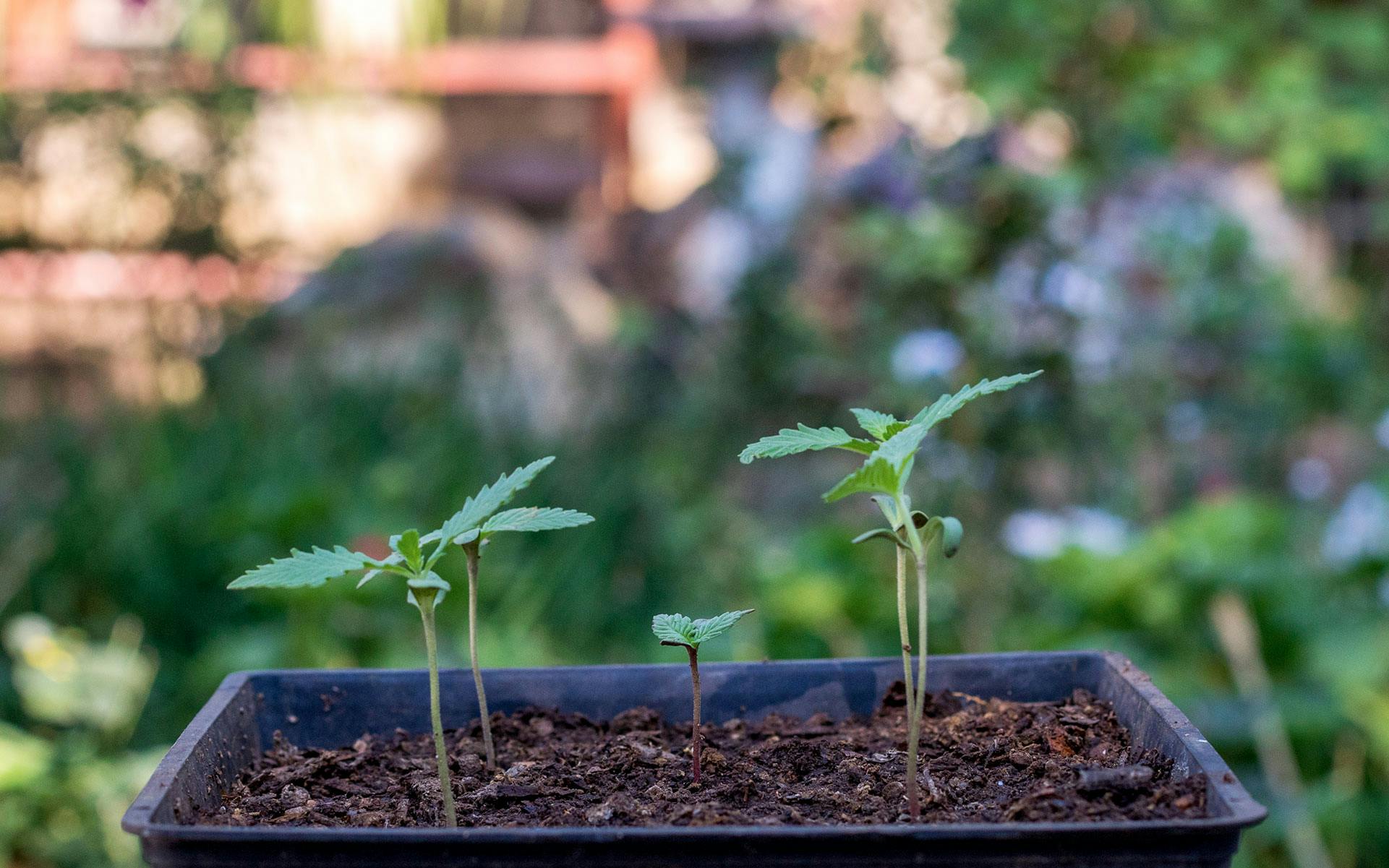Is marijuana legal in Michigan?
Current legality status
recreational
Cannabis is legal under state law for adults 21+.
Michigan has legalized both the medical and recreational use of cannabis. Adult-use cannabis is available for anyone 21 and up. Recreational dispensaries opened December 1, 2019.
Michigan recreational marijuana laws
In Michigan, anyone 21 and over can possess up to 2.5 ounces of usable cannabis or cultivate up to 12 marijuana plants for personal use inside a locked, enclosed facility. Those 21 and over can also legally store up to 10 ounces inside a private home—so long as it’s locked up in a secure location. Meanwhile, medical marijuana patients can possess even higher amounts under certain circumstances.
Cannabis delivery exists, but unlike states like California, Michigan requires delivery services only sell to a person who both makes the order and receives it: “A delivery employee shall verify that the person taking delivery is 21 years of age or older and the individual who placed the order.” The state also expects retailers to check whether the address given for a delivery is the same one provided at the time of ordering before completing a sale.
Possession/use limits
Adult marijuana consumers 21 years of age and older may possess:
- Up to 2.5 ounces of usable marijuana
- Up to 12 plants in a locked, enclosed facility
- No more than 15 grams of marijuana concentrate
Michigan recreational marijuana bills
Michigan introduced legal medical cannabis in 2008—ten years before passing legislation to allow recreational use by anyone 21 and over. The Michigan Regulation and Taxation of Marihuana Act, Initiated Law 1 of 2018, allowed for the creation of dispensaries to begin opening on December 1, 2019. That was an earlier start date than the state initially planned, so few stores were open within the first days of legalization.
Since then, dozens of stores have sprouted up, kicking off the state’s first months of full legalization in the midst of a global pandemic.
Michigan medical marijuana laws
Medical marijuana patients can possess up to 2.5 ounces of usable cannabis or have 12 plants that are kept in a locked, enclosed facility, the same limits that apply to recreational consumers 21 and over.
But medical patients can also have up to 16 ounces if it’s infused into a solid product or up to 36 fluid ounces without facing arrest, prosecution or other penalties.
Shop highly rated dispensaries near you
Showing you dispensaries nearMedical marijuana possession limits:
- Up to 2.5 ounces of usable marijuana
- Up to 12 plants in a locked, enclosed facility
- No more than 15 grams of marijuana concentrate
- Up to 16 ounces infused into a solid product
- Up to 36 fluid ounces of cannabinoid products in liquid form
Michigan medical marijuana bills
The Michigan Medical Marihuana Act, approved by voters in 2008, protects patients from arrest or prosecution only if they present both a registry identification card as well as a driver’s license or other government-issued identification card with their photograph.
Qualifying conditions for medical marijuana
Qualifying as a medical cannabis patient requires proof of state residency and having conditions specifically named by the state. The list of conditions includes:
- HIV/AIDS
- Glaucoma
- Hepatitis C
- Crohn’s disease
- Agitation of Alzheimer’s disease
- Nail-patella syndrome
- Amyotrophic lateral sclerosis
- Cancer
- Post-traumatic stress disorder (PTSD)
- Obsessive compulsive disorder
- Arthritis
- Spinal cord Injury
- Colitis
- Inflammatory bowel disease
- Ulcerative Colitis
- Parkinson’s disease
- Autism
- Tourette syndrome
- Cerebral palsy
A chronic or debilitating illness that features one of the following:
- Severe and chronic pain
- Severe nausea
- Cachexia (wasting disease)
- Seizures, including from epilepsy
- Severe and persistent muscle spasms
How to get a medical marijuana card in Michigan
Any Michigan resident 18 and over with a qualifying medical condition, or their primary caregiver, can apply for a medical marijuana registration card through the following steps:
- Obtain your medical records that prove you have a qualifying condition. The best case scenario is you receive a written recommendation from your doctor. But if they are not willing or unsure how to do that, request your medical records directly from your doctor’s office. Typically, this means filling out a patient access request and authorization form sent through the mail. Once you fill out that form and send it back to your doctor’s office, expect to receive your records within 5-10 business days.
- Visit a medical marijuana clinic in the state and bring your records. Some clinics require submitting medical records in advance, so call ahead. The doctor will review your medical records, perform an exam, and discuss whether cannabis can be used for treatment.
- Most clinics in Michigan require a $200 certification fee and an additional $60 fee for the state’s medical marijuana application. Renewals need to happen every two years and cost $150.
- Apply for a medical marijuana registration card. This can be done via the state’s website or through a paper application. You must include the following information: written certification from doctor, application or renewal fee, proof of Michigan residency (driver’s license, personal identification card or Michigan voter registration).
Note: The Health Insurance Portability and Accountability Act of 1996 gives every American the right to view and obtain their medical records. If you’re nervous about requesting your records for medical marijuana, you can tell your doctor’s office it’s for personal reasons.
Does Michigan accept out-of-state medical cards?
Yes, you can purchase marijuana in Michigan using an out-of-state medical marijuana registration card.
Since recreational marijuana is legal in Michigan, out-of-state visitors can purchase weed so long as they are 21 and over.
When does my Michigan medical card expire?
A medical card in Michigan expires every two years. The state’s medical marijuana law states that cards are issued to patients within five business days of an application being approved or renewed.
Michigan marijuana growing laws
Medical marijuana patients and anyone 21 and over can cultivate up to 12 plants at home for personal use. However, the plants must be kept inside a locked, enclosed space that’s not viewable to the public.
Michigan public consumption laws
As explained by Michigan’s recreational weed law, people are prohibited from consuming marijuana in a public place or on a property where the owner or manager prohibits use of the drug.
However, this does not include a place designated for weed consumption within a municipality that has authorized consumption in certain areas not accessible to people under 21.
It is unlawful for any person to engage in the use of marijuana items in a public place in Michigan.
A violation of this subsection is a civil infraction:
- The penalty for committing such an infraction is punishable by a $500 fine and forfeiture of the marijuana.
- A second violation can lead to a fine of no more than $1,000 and forfeiture of the weed.
- While a third violation is considered a misdemeanor, it is still not punishable by prison time. The third-time offender faces a fine of not more than $2,000 and forfeiture of the marijuana.
Michigan cannabis DUI laws
Legalization does not exempt users from penalization when they are going against the law. As in the rest of the world, driving while under the influence is illegal.
Any person is guilty of a DUI if they are driving under the influence of an intoxicating controlled substance, or under the influence of any combination of intoxicating liquor, an inhalant, or a controlled substance. No person authorized to use, possess, deliver, or produce marijuana for medical use shall be exempted from criminal charges under the law.
Michigan state law prohibits consuming marijuana while operating, navigating, or being in physical control of any motor vehicle, aircraft, snowmobile, off-road recreational vehicle, or motorboat, or smoking marijuana within the passenger area of a vehicle upon a public way.
In Michigan, a first-time weed DUI can lead to imprisonment up to 93 days, a $100-$500 fine and/or 360 hours of community service.
A second offense within seven years of the first one is punishable by imprisonment up to a year, $200-$1,000 fine, and/or 30-90 days of community service.
But things get a lot more serious with a third strike within seven years, which is considered a felony according to state law. It can lead to one to five years imprisonment, $500-$5,000 fine, probation for 30 days to a year, and/or community service for 60-180 days. The court can also order the offender’s vehicle to be impounded.
However, the Michigan Supreme Court has found that inert metabolites of cannabis are not considered Schedule 1 controlled substances.
In People vs. Koon (2013), the court decided that the state’s medical marijuana law trumped its DUI law, ruling in favor of a medical marijuana patient found with THC in his bloodstream when he was speeding. The state’s medical marijuana law protected him from criminal charges unless “the prosecution was able to prove that (Koon) was actually impaired by the presence of marijuana in his body,” the court wrote in its ruling.
Michigan cannabis testing regulations
Michigan sets itself apart from some other legal states through its clear, specific rules around testing. For one, the state tests for vitamin E oil, a substance approved by the FDA for topical use but not as an inhalant. The chemical exploded in popularity in the illegal vaping market.
The state’s Marijuana Regulatory Agency (MRA) has also limited all future vape additives to only substances with FDA approval as an inhalant. To ensure compliance with these rules, the agency requires twice-monthly inspections of processing facilities.
Cannabis testing includes an analysis of cannabinoid and terpene potency, moisture content, THC levels, inspection for foreign matters, pesticides, fungicides, insecticides, chemical residue, microbial and mycotoxin screening, and metals screening, according to MRA.
Common questions about marijuana legalization in Michigan
When did Michigan legalize?
Michigan legalized recreational weed in 2018 and legal sales started December 1, 2019.
Are dabs legal in Michigan?
Yes cannabis concentrates—sometimes called dabs—are legal in Michigan and are lab-tested for purity and accurate potency labeling.
How many recreational dispensaries are in Michigan?
About 114 as of June 2020.
Are drugs legal in Michigan?
No, Michigan has an extensive list of controlled substances beyond legalized alcohol, tobacco, cannabis, and caffeine.
Learn more about marijuana legalization in Michigan
Keep up with the latest news about legalization in Michigan
Stay current on Michigan’s laws by bookmarking Leafly politics and signing up for our newsletter.
Post last updated Sept. 6, 2020
By providing us with your email address, you agree to Leafly's Terms of Service and Privacy Policy.


